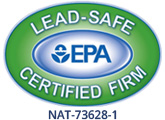How Does HVAC Corrosion Occur?
 Your home’s HVAC system has multiple metal components that help with efficient heating and cooling. These parts are exposed to moisture, refrigerant and other chemicals, increasing corrosion risks.
Your home’s HVAC system has multiple metal components that help with efficient heating and cooling. These parts are exposed to moisture, refrigerant and other chemicals, increasing corrosion risks.
Evaporator and condenser coils are the most vulnerable. As the material breaks down, refrigerant will begin to leak and the system won’t be able to properly heat or cool the air. In turn, the HVAC system ends up working harder to control the temperature and distribute air, leading to higher energy bills and overheating.
Understand how corrosion can develop in your HVAC system and what you can do.
How Corrosion Develops in an HVAC System
Corrosion is a significant concern for HVAC systems. Cracks or pits can develop, increasing the risk for refrigerant and other chemicals to leak out and enter the air. If this leak goes undetected, you may be exposing your family, pets and guests to above average amounts of these substances.
Corrosion begins when the condenser or evaporator coil is exposed to water, acetic acid, formic acid, fluoride or chloride. Exposure may come from the system itself – for instance, moisture accumulation around the coil – or one of the chemicals may enter from your home via cleaners, detergents, plywood, paint or heavy-duty adhesive.
Prolonged exposure can present as:
- Pitting Corrosion: Exposure to fluoride or chlorine ions results in this degree of corrosion, which appears as a pitted texture of pinhole fissures. Corrosion may be in response to fluoride-heavy water, exposure to snow melt or a detergent containing chlorine and tends to occur in response to a condensation issue inside the HVAC unit.
- Formicary Corrosion:This type of corrosion from exposure to formic or acetic acid results in a scratched, etched or cracked appearance over the metal coils or may first appear as blue-gray discoloration. Tunnels akin to an ant’s nest eventually form on the coils, leading to a refrigerant leak.
Development can occur following the installation of an HVAC system or updates to your home exposing ducts and other parts to solvents or other chemicals, or may form gradually.
Risks for HVAC Corrosion
In homes or commercial buildings, HVAC systems have higher risks for corrosion based on one or more of the following factors:
- Being located near the coast or a source of saltwater
- Being located in or near a facility that handles chemicals
- The property includes a pool or laundry facility
- The HVAC system is located within a water treatment plant
- HVAC components are adjacent to a sewer hookup
- Cheaper drywall made with sulfur was installed in your home or facility
Ignoring HVAC corrosion can:
- Cause refrigerant to leak out
- Prevent the HVAC system from heating and cooling efficiently
- Drive up energy bills
- Cause the HVAC system to break down prematurely, requiring extensive repairs or the installation of a new system
Repairing HVAC Corrosion
The necessary repairs will vary based on the degree of corrosion. If pitting or fissures emerge, the coil needs to be replaced. For older-model systems, replacement may be a challenge if a part cannot be sourced and may require a full system upgrade. Due to these factors, corrosion plays a role in close to half of all instances of a property owner needing to purchase an entirely new HVAC system.
The coil may need to be coated to prevent further degradation. To reduce these risks:
- Have your HVAC system routinely inspected at least once a year. During these maintenance appointments, a professional will assess the quality of the condenser and evaporator coils for corrosion and leaks.
- If you notice leaks, overheating, shutdowns or decreasing performance, do not delay getting maintenance and repairs.
- Limit using harsh, abrasive cleaning products near HVAC systems, especially those that emit volatile organic compounds (VOCs).
- Have the HVAC system cleaned regularly to limit the amount of dirt and debris circulating through the system.
- Complement your facility or home with an air cleaner or increased particle filtration.
Do you have concerns about a corroded HVAC coil or leaking refrigerant? Make an appointment with MJ Fahy & Sons to have your system inspected and repairs made as soon as possible. To schedule service for your home or business, contact us today.




